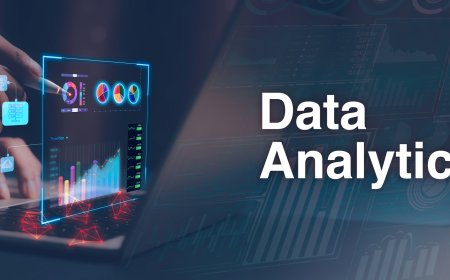The Data Analytics Course Fees
Explore the factors influencing data analytics course fees, including course length, certification, and materials, to make informed choices.

The emphasis on data analytics is growing louder in this era. Companies recognize data's crucial influence on strategic decisions, propelling professionals to master skills for this data-driven environment. However, amidst this rush, the cost associated with data analytics courses remains a peripheral, yet significant concern. Aspiring data analysts need to weigh the financial implications of such courses, balancing the pursuit of knowledge against the investment required to explore the changing demands of the digital environment effectively.
Understanding the Environment of Data Analytics Education
Understanding the sights surrounding data analytics courses is paramount before diving into the specifics of fees. The need for proficient data professionals has skyrocketed, largely due to the ever-expanding reliance on data for business strategies across industries. This surge in demand has led to an abundance of educational options, both through traditional institutions and online platforms, aiming to equip individuals with the necessary skills to thrive in this data-centric environment.
Getting Through the Web of Fee Structure
As with any educational pursuit, the question of cost looms large. The data analytics course fee landscape is diverse, ranging from free online courses to comprehensive, accredited programs with a heavy price tag. Understanding the factors influencing these costs is essential for prospective learners.
The nature of the course, its duration, and the institution offering it play significant roles in determining the fee structure. Short, specialized courses may come with a more affordable price, while comprehensive degree programs tend to be on the higher end. Furthermore, the reputation and accreditation of the institution often correlate with the cost, creating a nuanced decision-making process for prospective students.
What Influences Data Analytics Course Fees?
The confusing question then arises, what are the factors that contribute to the seemingly varied data analytics course fees? Let's break down the components that shape the financial investment associated with acquiring data analytics skills.
Detailed Analysis of Data Analytics Course Fees
Understanding the nuances of data analytics course fees is essential for prospective students and professionals looking to enhance their skills. The cost of these courses can vary widely based on several factors. Here’s a deeper look into the elements that influence the pricing of data analytics courses:
1. Course Type and Duration
-
Short Courses and Workshops: These are often designed to offer a quick, intensive dive into specific topics. Due to their brevity, ranging from a single session to a few weeks, their fees are usually more accessible. They're ideal for those looking to brush up on skills or gain a quick understanding of a particular aspect of data analytics.
-
Degree Programs and Extended Courses: Longer courses, including diploma programs or degrees, entail a significant time commitment, often spanning several months to years. These comprehensive programs cover data analytics in depth, from fundamental principles to advanced techniques. Their fees are higher, reflecting the extensive curriculum and the potential for a more profound career impact.
2. Institution Reputation
-
Accredited Universities: Courses offered by universities with a high reputation and accreditation status are priced at a premium. The fees not only account for the quality of education but also for the value of the certification received upon completion. These institutions often have seasoned professionals as instructors, further enhancing their offerings.
-
Online Educational Platforms: Many reputable online platforms provide data analytics courses at competitive prices. While they may not carry the same prestige as degrees from accredited universities, they offer flexibility and access to industry-relevant skills, often curated by experts in the field.
3. Delivery Mode
-
Online Courses: The digital nature of online courses allows for lower operational costs, which can translate to lower fees for students. Additionally, online courses offer the flexibility to learn from anywhere, making them a popular choice among working professionals.
-
In-Person and Hybrid Models: Traditional in-person classes or hybrid models, combining online and face-to-face learning, usually incur higher costs. These formats often offer the advantage of direct interaction with instructors and peers, which can enhance the learning experience but at a higher fee due to the additional logistics and resources required.
4. Included Resources
-
Software and Tools Access: Access to professional data analytics software and tools as part of the course can increase its value. These resources allow students to gain hands-on experience with the tools they will encounter in the workplace, making the learning experience more applicable and enriching.
-
Expert Guidance and Support: Courses offering personalized mentorship or access to industry experts for consultation can justify higher fees. This direct access to professionals for guidance, project reviews, or networking opportunities can significantly enhance the learning outcome and career prospects.
Additional Factors Influencing Course Fees
5. Certification and Accreditation
Courses that culminate in a recognized certification or are part of an accredited program often command higher fees. These certifications can be instrumental in career advancement, providing a clear ROI by enhancing the learner's employability and potential salary uplift.
6. Alumni Network and Career Services
Some institutions offer access to an alumni network and dedicated career services, including job placement assistance or career counseling. These added benefits can be a decisive factor for many, contributing to the overall course fee but offering valuable support in getting around the job market.
The Cost-Benefit Equation
Understanding the factors at play is just one side of the coin. The next logical step is evaluating the cost-benefit equation for aspiring data analysts. It's not just about the money spent; it's about the value derived from the educational investment.
For individuals contemplating a career shift or professional development, the potential return on investment (ROI) is a crucial consideration. This ROI extends beyond monetary gains and includes factors like career advancement, job satisfaction, and the ability to contribute meaningfully to data-driven decision-making within an organization.
Decoding the Data Analytics Course Fee Conundrum
In a world increasingly driven by data, the decision to pursue a data analytics course is a strategic one. The associated costs, while an undeniable aspect, should be viewed through the lens of long-term benefits and career growth.
Refer to these Blogs:-
Enhancing Analytics with AI and Natural Language Processing
The Impact of Analytics Professional Certification on Your Career
The Role of AI in Shaping the Future of Data Analytics
Deciding on a data analytics course involves navigating complex fee structures, and balancing the cost with potential career benefits. Prospective learners should assess courses based on factors like duration, institution reputation, delivery mode, and included resources. An informed decision, considering both the financial investment and the value it brings, can pave the way for significant professional development and career advancement in the data-driven environment.











































